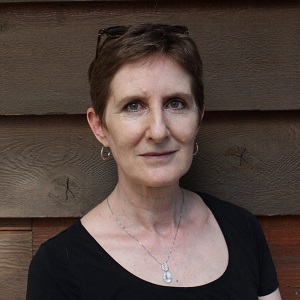You have no items in your cart. Want to get some nice things?
Go shopping
Our latest Flash of Inspiration interview is with Gerri Brightwell, a British writer who lives in Alaska. She has written novels as well as short fiction, for which she’s been listed for several prizes, including a Top 50 pick for the 2021 BBC National Short Story Award. She also teaches in the creative writing programme at the University of Alaska, Fairbanks. One of our fiction editors, Farhana Khalique, caught up with Gerri to talk about her Best Small Fictions 2023-selected piece, “Necessary Measures” and to discuss her writing process and tips.

Farhana: Hi Gerri, thanks so much for talking with us about your story, “Necessary Measures”, which we published online in Litro in September, and which was recently selected as a Best Small Fictions 2023 – congratulations! This is such a compact, but dynamic piece. I love how you use the single sentence/“breathless paragraph” form to tell the tale, which grabs the reader from the first words and doesn’t let go until the (horrifying) end. In fact, it left me literally open-mouthed! Was it your intention to shock the reader? Either way, how did you go about building the unique atmosphere of this piece?
Gerri: I wanted the calm after the storm of an invasion to become suddenly rife with danger. An occupied country is not going to be peaceful – the occupiers surely live in a state of vigilance that can instantly morph into paranoia. For that to come across in the story, I had to create a sense of quiet then to disrupt it in a small way – a smell, a suspicion. Once the suspicion has taken root, the story has to ratchet up the consequences. If you have tanks in the opening, the ending must be more personal, and more terrible.
Farhana: We’ve published another one of your pieces before in Litro, “Dazzle”, another flash piece that shares some similar themes. It’s also another short, but exhilarating piece. Power, corruption, the imbalance between rich and poor, men and women – what is it about these themes that interests to you as a writer?
Gerri: Living in the US has made me keenly aware of how certain groups don’t get to make decisions about how the country is run, and how the fiction of “this is the way things must be” is maintained by those who profit from the status quo. I don’t want my fiction to be didactic, but I also don’t want my work to ignore what we know in our hearts to be true: that those in power shape the world around their own interests.
Farhana: What is the appeal of the short form for you? Do you have any favourite short stories/pieces that you’ve read in Litro?
Gerri: Flash works by implying a larger story without having to put it on the page. It’s difficult to do that well as there isn’t much room for a slow lead-up, or for the sort of looseness you find in a more conventional short story. Once I have an idea, writing it is like doing a puzzle: I have to find the right starting point, the right image, the right “turn” (like poetry, flash generally has a turn) plus – hardest of all – an ending that is going to rattle around in a reader’s head long after they’ve finished reading.
One of my favourite pieces in Litro is “Mardi Gras“ by Louis Gallo. The story seems to start slowly – a family’s right at the front of a crowd watching the New Orleans Mardi Gras parade. There’s noise, and heat, and one young man giving out whole bags of Mardi Gras beads. Then the piece takes a dreadful turn, and what was embedded in that build-up comes back, shockingly tainted. It’s such a clever story.
Farhana: Do you have a writing tip that you could share with our readers/future contributors?
Gerri: Yes, absolutely. For very short work, every word needs to earn its keep without the piece becoming telegraphic – it must be tight without the reader getting a sense of it having been pared down. I keep an eye out for unnecessary filtering: filtering happens when experiences are run through a character e.g. “Louis watched the smoke trickling out from the burning rubbish.” If we’re already with a character, we don’t need to keep being reminded that we’re in their experience with “he heard”, “he saw”, “he felt”. It’s more efficient and more immediate to write, “The smoke trickled out from the burning rubbish.”
Farhana: Where can we read or buy more of your work? What else are you working on?
Gerri: My latest novel, Turnback Ridge, came out in October 2022 and can be found at major online retailers. It’s a novel about Alaska a few years in the future when global warming and immigration have become even more urgent issues. I have three previous novels: Dead of Winter, The Dark Lantern, and Cold Country. My short story “Windfall” just came out in Raritan: A Quarterly Review and I’m particularly proud of it – it was rejected more times than I can count because it’s an odd story, but one close to my heart.
Thanks again to Gerri for her fascinating and generous insights! And if you’ve been inspired to write more and to submit your work for publication, check out our new Masterclasses with our award-winning writers, where you can sign up for one or more of our workshops designed to hone your craft. Limited seats, so sign up now! Full details, here.

About Farhana Khalique
Farhana Khalique is a writer, voiceover artist and teacher from south-west London, UK. Her writing has appeared in Tales From the City, Best Small Fictions 2022, 100 Voices, and more. She is also a submissions editor at SmokeLong Quarterly and a fiction editor at Litro. Find Farhana @HanaKhalique and www.farhanakhalique.com.
- Web |
- More Posts(4)




